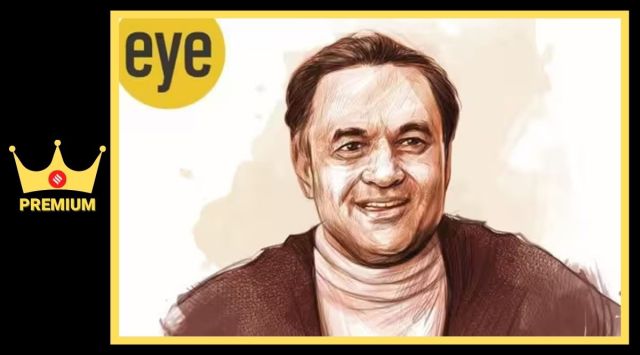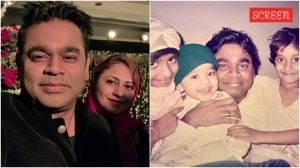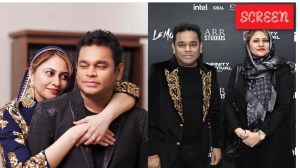Singing the blues: Mukesh sang of the common man’s hopes, anguish and transcience of life
He sang of the common man’s hopes, anguish and transcience of life. On his centenary, remembering playback singer Mukesh
 Mukesh’s voice imbued these pieces with a simplicity that relayed the emotions of the common man and spoke of love, loss and the transience of human relationships. (Illustration: Suvajit Dey)
Mukesh’s voice imbued these pieces with a simplicity that relayed the emotions of the common man and spoke of love, loss and the transience of human relationships. (Illustration: Suvajit Dey) Year 2014. Surrounded by snow on either side of the road, a taxi waded through the Russian port of Murmansk, about 150 km from the ‘end of the Earth’ in the Arctic Circle — where tourists go in search of the Northern Lights. As he drove, Roma, the cab driver, played his favourite Raj Kapoor numbers. Composer duo Shankar-Jaikishan’s Mera joota hai japani (Shree 420, 1955) and the Chaplinesque Awara hoon (Awara, 1951) rumbled through the speakers, while Roma sang along lyricist Shailendra’s lines in Hindi, with a strong Russian accent.
Generations of Russians have seen and loved Kapoor’s films and songs. In the 1950s, a time when the Soviet Union was still recovering from World War II, amid the poverty and shortage of food, they found hope in Kapoor’s on-screen character, Raju, a Dickensian hero who smiled and sang through his pain. He struck a chord, and so did that “laal topi Rusi”, which added to the cultural comradeship.
Playback singer Nitin Mukesh and his son and actor Neil Nitin Mukesh sat at the back of Roma’s car. Neil was in Murmansk to shoot for Abbas Mastan’s Players (2015) with his father accompanying him on the trip. They asked Roma if he knew who had sung these songs. Without batting an eyelid, Roma answered, “Mr Raj Kapoor”.
A beaming Nitin told him that the singer was Mukesh, his father, and not Kapoor. A stunned Roma stopped the car, held Nitin’s hand, and with eyes welling up, spoke of how he grew up with these melodies and this voice. “It was quite amazing and strange. We were so far away from home, surrounded by a white stretch of snow, and here was a man tearing up about my grandfather’s songs from over 50 years ago. It was surreal. It put Mukesh saab’s brilliance and significance in perspective for me,” says Mumbai-based Neil.
***
“Main toh sirf ek jism hoon, haad maans ka putla hoon; Rooh agar koi hai mujhme, toh woh Mukesh Chand hai (I am just a body, flesh and bone. If there is a soul inside of me, that’s Mukesh Chand),” Kapoor had once said in a speech about his onscreen voice and playback singer Mukesh Chand Mathur, a young boy from Delhi’s Daryaganj, who would become one of Hindi cinema’s most iconic playback voices.

 Raj Kapoor with Mukesh (Credit: Express Archives)
Raj Kapoor with Mukesh (Credit: Express Archives)
Be it the innocence of Jeena isi ka naam hai (Anari 1959), the austerity of Sajan re jhooth mat bolo (Teesri Kasam, 1966), the frolic of Dum dum diga diga (Chhalia, 1960), the vulnerability of Kahin door jab din dhal jaaye (Anand, 1971), the pathos-laden Ye mera deewanapan hai (Yahudi, 1958), a poet reminiscing in Main pal do pal ka shayar hoon (Kabhi Kabhie, 1976) or a clown’s philosophy on life and death in Kapoor’s reflective Jeena yahan marna yahan (Mera Naam Joker, 1970) Mukesh’s voice imbued these pieces with a simplicity that relayed the emotions of the common man and spoke of love, loss and the transience of human relationships.
“With Mukesh, it never felt that a professional was singing these songs. It was as if this person was telling you what he felt,” said poet-lyricist Majrooh Sultanpuri in an interview to Doordarshan in the ’90s.
If Hindi films were once the opiate for Indians, their music was the soundtrack of our lives. Lyricists and composers Hasrat Jaipuri, Shailendra, Majrooh Sultanpuri, Naushad, Shankar-Jaikishan, OP Nayyar and Anil Biswas produced compelling narratives for the films and their melodies catapulted playback singers into superstars. Mohammed Rafi, Manna Dey and Lata Mangeshkar’s voices reverberated in every home.
***
Mukesh was 17 when he came to Mumbai with actor Motilal, who had heard the Class X student sing along with his harmonium at his sister’s wedding to entertain the baraat. Until then, Mukesh’s only training had been from a music teacher who taught his older sister classical music. His father, a businessman with 10 children, was hoping that Mukesh would study further and become a clerk. He wasn’t keen on a career in films, which was unpredictable and not for ‘children from good families’. But Motilal dangled the one name that Mukesh’s father recognised — KL Saigal — and that his son could be a bigger star than Saigal, a renowned name of the time. He agreed.
Once in Mumbai, Motilal gave Mukesh food, shelter and made sure that he honed his skill under a music teacher. This was 1940 when Hindi cinemawas in its nascent stages and the singer-actor culture was prevalent. “He was a good-looking man, so he was offered a film,” says Nitin. Mukesh’s first project was a film named Nirdosh (1941), where he starred opposite actor Nalini Jaywant. But the film tanked and so did Mukesh’s first song — Dil hi ho bujha hua toh. The company shut down and Mukesh was out of a job. “After this, I became a share broker, a dry-fruit seller and did one thing after another as playback singing as a profession did not exist until 1942, when Debaki Bose began singing in Calcutta,” said Mukesh in an interview to BBC Hindi.
“He tried film distribution, too, but that didn’t work either. He soon realised that it was better to be a first-class singer than a second-class actor. So he focused on music,” says Nitin.
It took Mukesh four years to find the next opportunity. Motilal, who was the lead in Mazhar Khan’s Pehli Nazar (1945), helped him get one song in the film. Mukesh recorded the piece — an Anil Biswas composition — in a nasal timbre, an attempt to ape Saigal. Everything went well, but Khan refused to include the song in the film claiming that the grief-stricken song for an otherwise boisterous hero in the film, would be a drag. Upon many requests from Mukesh, it was agreed that the song will be in the film for a week and will be removed if it didn’t work. The song, Dil jalta hai toh jalne de, a salve for broken hearts, would go on to rule the airwaves for weeks to come and still remains a cult classic. “Those who walked into the cinema halls, came out with that one song which has stayed on till today,” says Nitin.
Mukesh became popular overnight . And as legend goes, when the song reached Saigal through radio, he is known to have asked, “When did I record this one?” “There couldn’t have been a bigger compliment,” says Neil.
Soon, with composer Naushad’s help, who suggested he sing in his own voice and not emulate Saigal, Mukesh developed his own style. The result were classics such as Gaaye ja geet milan ke (Mela, 1948) and Hum aaj kahin dil kho baithe (Andaz, 1949).
And so, he had arrived. Unlike the classically trained voices of his brilliant peers such as Talat Mahmood, and later Rafi and Manna Dey, Mukesh’s voice felt huge-hearted and nuanced— the voice of a man you could talk to, share your thoughts with. It came with subtle but exact expressions, and for the most part, did not sound overtly ambitious. It was just right, wondrous and philosophical.
But while Mukesh fit into most of the frames and constructs that were offered to him, it was the trademark song of melancholy, the plaintive notes, that he came to be identified the most with. He could plumb the depths of a nation’s soul. Songs such as Sahir Ludhianvi’s battered but hopeful Woh subah kabhi toh aayegi (Phir Subah Hogi, 1958), or Heeraman’s poignant ballad Sajanwa bairi ho gaye hamaar (Teesri Kasam, 1966), the moving pukaar in Aa laut ke aaja mere meet (Rani Rupmati, 1959), the wistfulness of Ek pyaar ka naghma hai (Shor, 1972) or that epic love triangle classic, Dost dost na raha in Raj Kapoor, Rajendra Kumar and Vyjayanthimala-starrer Sangam (1964) were a testament to that. “If I get 10 light songs and one sad song, then I’ll leave those 10 songs for that one sad song,” he told BBC Hindi, a few months before he passed away in 1976.
 Laxmikant, Mohammad Rafi, Mukesh, Lata Mangeshkar, Kishore Kumar, Manmohan Desai. (Credit: Express Archives)
Laxmikant, Mohammad Rafi, Mukesh, Lata Mangeshkar, Kishore Kumar, Manmohan Desai. (Credit: Express Archives)
Ninety-year-old Anandji Shah, of noted music duo Kalyanji-Anandji, who worked extensively with Mukesh, told The Indian Express, “His voice could accentuate sad songs like no one else. Ours was a time of social and romantic dramas and the way he’d emote such tender emotions was brilliant. If I look at any of our songs by Mukesh saab such as Koi jo hamara hridaya tod de, Chandan sa badan, or Mujhko iss raat ki tanhai mein awaz na do, he’s emoted so tenderly. In fact we won our first National Award in 1968 for Saraswatichandra and Chandan sa badan was the marquee piece.”
The rumination in Mukesh’s voice even moved a musician of the stature of Manna Dey, who owned the entire collection of the singer’s over 1,000-song oeuvre, would often say, “Would I ever be able to sing like him? With the pain that Mukesh ji finds and channels in what he sings?”
According to Nitin, his father was great at pathos not because of any struggle in his life but because of his sense of empathy. “He was a compassionate person. There were small but beautiful things he would do. Even at the peak of his career, if he was leaving the city for concerts, he would make sure that he met this couple who cleaned the building to tell them he was leaving, ‘but Nitin is at home in case you need something’. The guy who ironed our clothes had invited him to his daughter’s wedding once. He not only went but also sang a couple of songs for the gathering. Back in the day, most people, especially the famous ones in the industry, would not consider doing such things,” says Nitin, who will spend the year touring and singing tribute concerts for his father.
Shah has always called the singer “Kalyug mein Satyug ka aadmi” and that he was one of the most genuine and sincere artistes in the film industry. “He worked for the love of the art and wasn’t interested in any politics,” says Shah, who adds that once the composer duo got Manhar Udhas (Pankaj Udhas’s brother) to record one of the Kalyanji-Anandji songs because Mukesh wasn’t available. They told Manhar that this was a scratch and that Mukesh will come back and record. “When he came back and heard the track, Mukesh ji told us that it was a perfectly well-sung piece and that the original should be retained. His earnestness kickstarted Manhar Udhas’s career,” says Shah.
In case there was a new actor in the industry, many composers always asked Mukesh to sing for him. “Because Mukesh’s voice for the hero meant that the song would be a hit. We tried this with Manish Kumar in Saraswatichandra (1968) and Dharmendra in Dil Bhi Tera Hum Bhi Tere (1960),” says Shah.
Also well-known are his friendships with other playback singers such as Rafi, Dey, and Mangeshkar. “So much so that when he heard Rafi’s Din dhal jaaye in Vijay Anand’s Guide (1965), he wept,” says Nitin. He picked up the phone, called Rafi, and told him ‘Why can’t I sing like you?’.
Then there was his reverence for Mangeshkar and her music. The two were close friends. In fact, they were touring in the US, when Mukesh had a heart attack in his hotel room in Detroit, 30 minutes before he was to go on stage, and passed away. He was 53.
When Nitin and Mangeshkar brought Mukesh back from Detroit, India wept. Kapoor was inconsolable. At the funeral, he kept saying, “Meri toh awaaz hi chali gayi (I have lost my voice)”.
Songs that spoke to us
Dil jalta hai toh jalne do (Pehli Nazar, 1945): Mukesh’s first playback, this gave the singer an indelible identity: of a man who could deliver sorrow like no one else
Awara hoon (Awara, 1951): This was the song of free, newly-Independent India, one that along with a couple of others, established the Chaplinesque image of Raj Kapoor
Mera joota hai japani (Shree 420, 1955): This patriotic piece became an anthem in India and the Soviet Union
Ye mera deewanapan hai (Yahudi, 1958): The song became the go-to number for the brokenhearted
Sajan re jhooth mat bolo (Teesri Kasam, 1956): Mukesh sang Shailendra’s moving and philosophical lyrics, describing the futility of life
Woh subha (Phir Subah Hogi, 1958): With much symbolism for the times, this contemporary political message was about the sharp social divide. Sahir Ludhianvi needed a tune that would relay his thoughts gently, without being a recitation, and yet with the effect of recitation. Composer Khayyam went to one of his favourite ragas ,Yaman Kalyan, and singer Mukesh to create this melody of hope.
Suhana safar (Madhumati, 1958): One of Salil Chowdhury’s finest, Mukesh’s voice and Dilip Kumar’s charisma made it an audience favourite
Kahin door jab (Anand, 1971): Yogesh’s lyrics and Mukesh’s soulful voice are the enduring appeal of this song about memories, fears and not wanting to let go
Jeena yahan marna yahan (Mera Naam Joker, 1970): In Kal khel mein hum ho na ho, gardish mein taare rahenge sada, the joker sang of a transient world
Main pal do pal ka shayar (Kabhi Kabhie, 1976): This merged the concept of the fleeting nature of an artiste’s fame with that of the poet’s own life
Must Read
Nov 20: Latest News
- 01
- 02
- 03
- 04
- 05








































